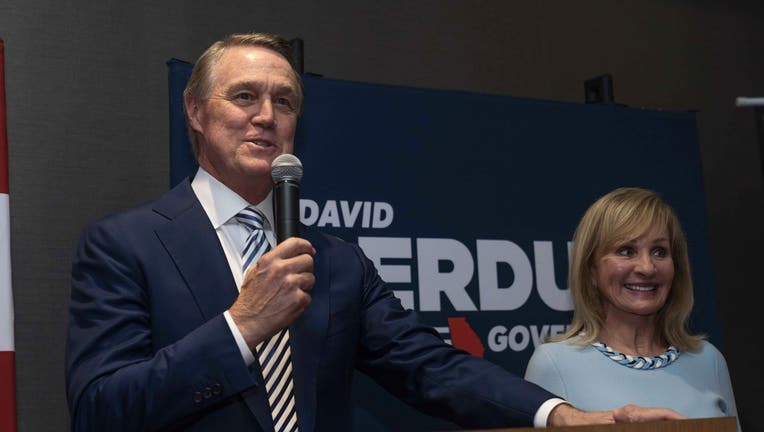Former Georgia Sen. David Perdue confirmed as ambassador to China

Former U.S. Sen. David Perdue speaks to supporters at an election-night event on May 24, 2022 in Atlanta, Georgia. (Photo by Megan Varner/Getty Images)
ATLANTA - As tensions escalate between Washington and Beijing, the U.S. Senate has confirmed former Georgia Sen. David Perdue as ambassador to China, tasking him with one of the most high-stakes diplomatic assignments in years, according to The Associated Press.
What we know:
David Perdue, a Republican who represented Georgia in the U.S. Senate from 2015 to 2021, was confirmed Tuesday as U.S. ambassador to China by a 67–29 vote, with support from several Democrats. The confirmation comes as U.S.-China relations reach a boiling point over tariffs, trade, and global competition.
During his confirmation hearing earlier this month, Perdue described the U.S.-China relationship as the "most consequential diplomatic challenge of the 21st century," calling for a balanced and forward-looking approach. "Our approach to China should be nuanced, nonpartisan and strategic," he said.
Perdue was nominated in December by President Donald Trump, who recently imposed 145% tariffs on Chinese imports. China responded with a 125% tariff on U.S. goods, deepening an already strained economic standoff with no clear path to resolution.
PREVIOUS STORY: Trump taps Georgia's David Perdue to serve as U.S. Ambassador to China
The backstory:
Perdue, a former Fortune 500 CEO, entered politics in 2014, winning a Senate seat as a Republican outsider with deep business credentials. He lost his reelection bid to Democrat Jon Ossoff in a pivotal 2021 runoff. The following year, he unsuccessfully challenged Georgia Gov. Brian Kemp in a GOP primary, campaigning on Trump’s baseless claims of election fraud in 2020.
Despite his political losses, Perdue remained a trusted Trump ally. His background in global business—including leadership roles at Sara Lee, Reebok, and Dollar General—was cited as a key asset in navigating the complex trade and diplomatic landscape between the U.S. and China.
Big picture view:
Perdue steps into the ambassadorship at a time when U.S.-China competition extends far beyond tariffs. Beijing has increased its military presence in the Taiwan Strait and South China Sea and has emerged as a rival in emerging technologies, including artificial intelligence and robotics. While the Trump administration has pushed aggressive trade penalties, it is also weighing how to avoid direct military confrontation.
China, for its part, is moving to reduce dependence on U.S. trade. "No matter how the global situation changes, we will anchor our development goals, maintain our strategic focus and concentrate efforts on doing our own work," said Zhao Chenxin, vice chairman of China’s National Development and Reform Commission.
Yun Sun, director of the China program at the Stimson Center, said Perdue’s arrival is well-timed. "Credible points of contact" are critical, she said, for stabilizing U.S.-China relations amid high-stakes disagreements.
What they're saying:
Senate Foreign Relations Committee Chairman Jim Risch, a Republican from Idaho, emphasized the importance of the appointment. "Perdue’s nomination was certainly one of the most important appointments that will come across this floor," he said ahead of the vote.

